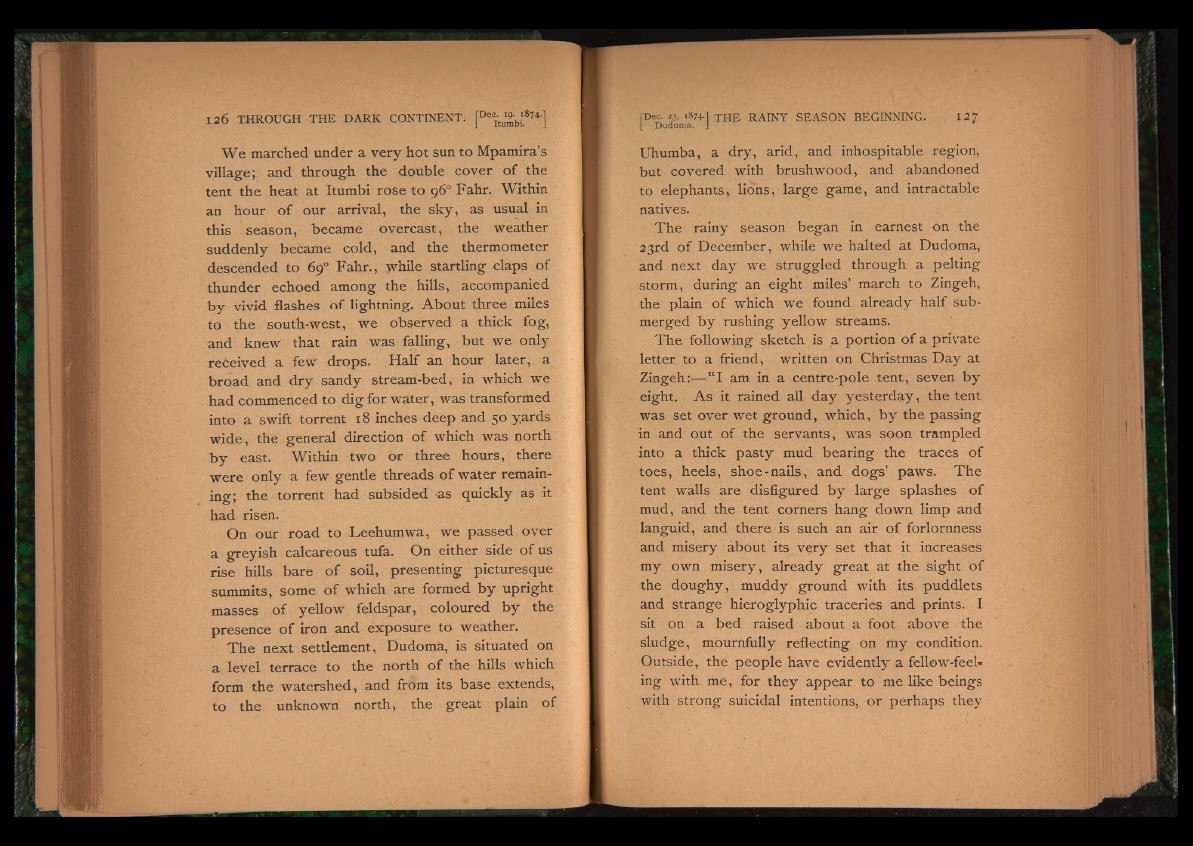
W e marched under a v e ry hot sun to Mpamira’s
village; and through the double cover o f the
tent the heat at Itumbi rose to 96o Fahr. Within
an hour o f our arrival, the sk y , as usual in
this season, became overcast, the weather
suddenly became cold, and the thermometer
descended to 69o Fahr., while startling claps o f
thunder echoed among the hills, accompanied
b y vivid flashes o f lightning. A b ou t three miles
to the south-west, we observed a thick fog,
and knew that rain was falling, but we only
received a few drops. Half an hour later, a
broad and d ry sandy stream-bed, in which we
had commenced to dig for water, was transformed
into a swift torrent 18 inches deep and 50 yards
w id e , the general direction o f which was north
b y east. Within two or three hours, there
were only a few gentle threads o f water remaining;
the torrent had subsided as quickly as it
had risen.
On our road to Leehumwa, we passed over
a greyish calcareous tufa. On either side o f us
rise hills bare o f soil, presenting picturesque
Summits, some o f which are formed b y upright
masses o f y e llow feldspar, coloured b y the
presence o f iron and exposure to weather.
T h e next settlement, Dudoma, is situated on
a level terrace to the north o f the hills which
form the watershed, and from its base extends,
to the unknown north, the great plain o f
[Dec. 23, •874-1 THE RAINY SEASON BEGINNING. 127 [ Dudoma. J
Uhumba, a dry, arid, and inhospitable region,
but covered with brushwood, and abandoned
to elephants, lions, large game, and intractable
natives.
The rainy season began in earnest on the
23rd o f December, while we halted at Dudoma,
and next day we struggled through a pelting
storm, during an eight miles’ march to Zingeh,
the plain o f which we found already half submerged
b y rushing y e llow streams.
T he following sketch is a portion o f a private
letter to a friend, written on Christmas D a y at
Zingeh:— “ I am in a centre-pole tent, seven b y
eight. A s it rained all d a y y e s te rd a y , the tent
was set over wet ground, which, b y the passing
in and out o f the servants, was soon trampled
into a thick pasty mud bearing the traces o f
toes, heels, shoe-nails, and d ogs’ paws. T h e
tent walls are disfigured b y large splashes of
mud, and the tent corners hang down limp and
languid, and there is such an air o f forlornness
and misery about its v § ry set that it increases
my own misery, already great at the sight o f
the doughy, muddy ground with its puddlets
and strange hieroglyphic traceries and prints. I
sit on a bed raised about a foot above the
sludge, mournfully reflecting on my condition.
Outside, the people have evidently a fellow-feeling
with me, for th ey appear to me like beings
with strong suicidal intentions, or perhaps they